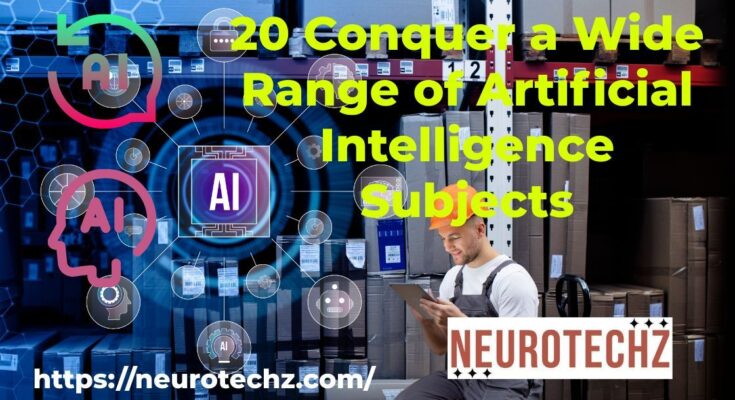Artificial Intelligence Subjects have become a transformative force impacting many aspects of our lives
All of the topics in Artificial Intelligence contribute to the creation and use of intelligent systems. In this piece, we shall explore the vast and ever-changing field of Artificial Intelligence, highlighting significant themes that will influence the future.
Machine Learning
Algorithms that allow systems to learn from data and gradually improve their performance are the foundation of machine learning (ML), the branch of artificial intelligence subjects. Supervised, unsupervised, and reinforcement learning are examples of machine learning subjects essential to building intelligent models that can make judgment calls and predictions.
Natural Language Processing (NLP)
Natural language processing (NLP) studies how computers process language. Studying NLP subjects involves creating models and algorithms that let computers comprehend, interpret, and produce human language. Virtual assistants, chatbots, sentiment analysis, and language translation are just a few examples of applications.
Robotics
To construct intelligent devices that can carry out activities in the real world, robotics is an interdisciplinary field that combines computer science, engineering, and artificial intelligence subjects. Automation, medicine, and space exploration are just a few fields that robotics studies. Other topics include human-robot interaction, motion planning, and sensor integration.

Expert Systems
Expert Systems refer to the process of creating computer programs that simulate the ability of a human expert in a particular field to make decisions. This field studies rule-based reasoning, inference engines, and knowledge representation, which helps with financial planning and healthcare diagnostics, among other applications.
Data Science
Data Science is essential to gleaning valuable insights from massive databases, even if it is not limited to artificial intelligence subjects. Data science subjects enable AI applications by offering the required input for training and validation, such as statistical analysis, data mining, and data visualization.
Ethics and Bias in Artificial Intelligence Subjects
Concerns about bias and ethics are becoming more and more prominent as AI is incorporated into society. This study area ensures that AI technologies are created and used ethically by addressing problems, including algorithmic bias, privacy difficulties, and the responsible usage of artificial intelligence subjects.
Personalized User Experiences
Website personalization is made possible in large part by AI algorithms. By analyzing user behaviour and preferences, artificial intelligence subjects create more relevant and engaging online experiences, from recommendation engines on streaming platforms to targeted advertising on social media.
E-Commerce Revolution
AI is to blame for a massive change in online commerce. E-commerce experiences that are smooth and productive are enhanced by chatbots for customer service, intelligent recommendation systems, and predictive analytics. Through supply chain optimization, improved customer understanding, and increased overall operational efficiency, artificial intelligence subjects help enterprises.
Chatbots and Virtual Assistants
Online conversations now frequently involve chatbots and virtual assistants driven by artificial intelligence subjects. These intelligent objects can respond to questions from clients, offer details, and even carry out jobs. They increased user satisfaction by incorporating natural language processing (NLP), enabling more organic and context-aware dialogue.
Cybersecurity and Fraud Detection
Artificial Intelligence online is vital to cybersecurity as cyber threats change. Cyberattacks, viruses, and fraudulent activity can all be identified by patterns that machine learning algorithms can identify. AI strengthens online platform security by protecting sensitive data through real-time analysis of massive volumes of data.
Content Creation and Curation
Content production and curation are becoming more and more involving AI algorithms. AI-powered systems use deep learning and language models to create high-quality content, which ranges from creating news articles to creating customized playlists. Doing so opens up new opportunities and speeds up the process of creating content.
Educational Technologies
Personalized learning experiences provided by AI are revolutionizing the field of online education. Personalized material delivery, learning gap identification, and progress assessment are all made possible by artificial Intelligence online in adaptive learning platforms. Online education is made more successful by interactive simulations and virtual tutors.
Healthcare Innovations
AI supports medication discovery, tailored treatment regimens, and accurate diagnosis in the online healthcare space. To facilitate remote consultations and increase access to healthcare, telemedicine platforms use artificial Intelligence (AI) to evaluate medical data.

Challenges and Future Prospects
Despite its advantages, integrating AI online has many drawbacks, such as potential algorithmic biases, data privacy difficulties, and ethical concerns. To ensure ethical and responsible use, we must address these issues in the future and keep improving AI systems.
A Machine Learning Engineer’s Essential Duties
Algorithms that allow computers to learn from data and make wise decisions are developed and implemented in large part by machine learning engineers. Their duties span several phases in the machine learning lifecycle: data gathering, preprocessing, training models, assessment, and implementation. Working in cross-functional teams, these experts comprehend business requirements, create workable solutions, and guarantee that machine learning models are seamlessly incorporated into current systems.
Important Capabilities and Certifications
Engineers need a broad range of skills to succeed in the fast-paced field of machine learning. Strong mathematical and statistical foundations and proficiency in programming languages like R and Python are essential. Robotics Popular machine learning frameworks like TensorFlow and PyTorch should also be accessible to engineers. One must thoroughly understand data structures, algorithms, and domain-specific expertise to build successful and efficient machine-learning solutions.
In this industry, where machine learning tools and approaches are constantly changing, success is characterized by continuous learning. Excellent Machine Learning Engineers possess a strong sense of problem-solving, flexibility, and critical thinking.
Effects on industries
Using data-driven insights, machine learning engineers are leading the way in revolutionizing industries. Machine learning influences several sectors, including e-commerce, healthcare, banking, and autonomous cars. These experts use recommendation engines, pattern recognition, and predictive analytics to help make better decisions and provide better user experiences.
Potential and Difficulties for the Future
Engineers with machine learning skills will become much more important as technology develops. More need for qualified workers in this industry will come from incorporating machine learning into daily products like autonomous systems, smart homes, and tailored healthcare. Nevertheless, the machine learning community must adhere to responsible and moral behaviour in light of algorithmic bias, data privacy, and ethical concerns.
Computer Vision
Machine interpretation and decision-making based on visual data are made possible by artificial intelligence subjects in computer vision. Advancements in autonomous vehicle driving, facial recognition, image segmentation, object identification, and medical image analysis are among the topics covered by computer vision.
Summary
The study of artificial intelligence subjects encompasses various topics that all work together to shape and advance this dynamic and vast discipline. This revolutionary technology is interdisciplinary, as seen by the wide range of AI disciplines it covers, from robotics and ethical implications to machine learning and natural language processing. The intersection of these fields will undoubtedly influence the direction of artificial intelligence subjects in the future as academics and practitioners keep pushing the boundaries.




